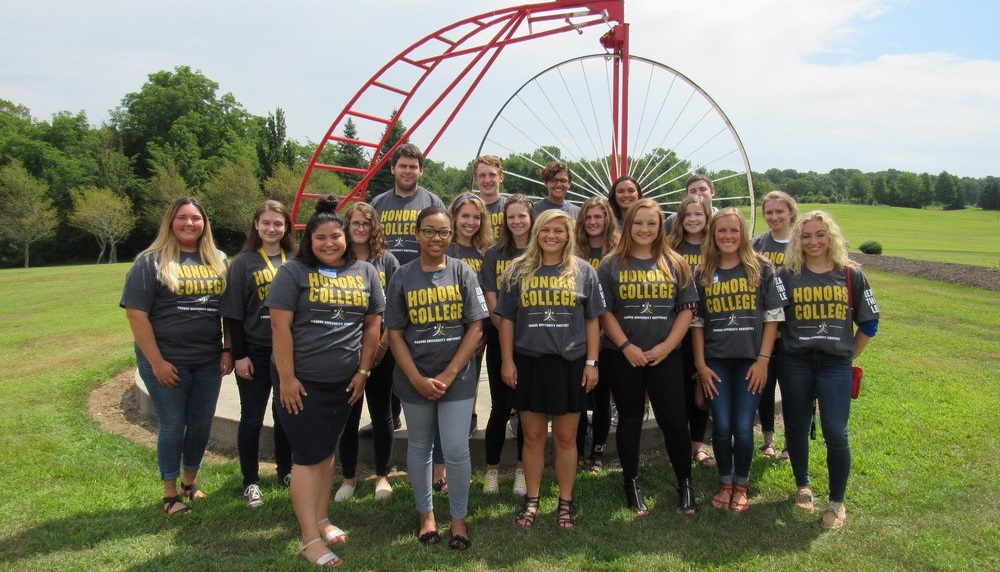|

Hammond Location: SUL Building Room 320; Phone: 219-989-3160
Westville Location: Library Student Faculty Building Room 028; Phone 219-785-5366
Mission
The Honors College at Purdue University Northwest is dedicated to enhancing the learning experiences of highly motivated and academically exceptional students. Students in the Honors College engage in advanced coursework, community outreach, substantive research, study abroad, cultural and social activities, and regular interaction with the university’s most outstanding students and professors. Through these kinds of special learning opportunities, the Honors College fosters academic excellence, critical thinking, vital leadership skills, social and civic responsibility, and other virtues required of outstanding citizens and leaders.
Application
Admission to the Honors College is open to all Purdue University Northwest new Freshmen who meet the minimum criteria of a High School GPA of 3.0 or above and at SAT score of at least 1130 or an ACT score of at least 23.
Transfer students should have a minimum GPA of 3.0 from their most recent college or university and meet the SAT or ACT scores listed above.
Current PNW students may be admitted if they have a minimum PNW GPA of 3.0 and meet the SAT or ACT scores listed above.
The Honors College is open to students in all degree programs.
Eligible students will be invited to join the Honors College when they apply to PNW.
Benefits
Honors College students have the opportunity to:
- Develop leadership skills inside and outside the classroom;
- Make an impact by volunteering;
- Take specialized, honors-only, interdisciplinary classes;
- Apply for financial support to study abroad or present research at a national conference;
- Conduct research with outstanding faculty;
- Become a member of a caring community of high-achieving students, faculty, and staff.
Students who successfully complete Honors College curriculum earn a gold seal on their diploma and a notation on their official transcript.
In addition:
- Over 55% of honors graduates had full-time jobs within six months of graduating;
- Over 22% of our graduates are continuing their education in graduate programs including University of Illinois at Chicago, Notre Dame University, and Purdue University.
- Honors students have held for-credit internships at Disney World, Arcelor Mittal, John Deere, Porter Regional Hospital, and Indiana Department of Transportation.
No extra credit hours are required: Honors College coursework is built into students’ plans of study.
Curriculum
Curriculum (Incoming Freshman)
Semester 1
HONR 11100 Honors Cohort I
Semester 2
HONR 11200 Honors Cohort II
Semester 3
HONR 21100 Honors Cohort III
Semester 4 or 5
Choose One:
HONR 39000 Junior Level Topics
HONR 39100 Honors Humanities Topics
HONR 39200 Honors Social Science Topics
Semester 6
HONR 40000 Honors Capstone Project
Semester 7/8
Honors Thesis or Honors Elective
Any of Semester 3-7
Honors Stacked Course
Honors Elective
Curriculum (Admission after the Freshman year)
HONR 21200 Upperclass Introduction to Honors
Semester 4 or 5
Choose One:
HONR 39000 Honors Special Topics
HONR 39100 Honors Humanities Topics
HONR 39200 Honors Social Science Topics
Semester 6
HONR 40000 Honors Junior Seminar
Semester 7/8
Honors Thesis or Honors Elective
Any of Semester 4-7
Honors Stacked Course
Honors Elective
Additional Requirements: Volunteer work; regular participation in Honors College activities; two annual individual meetings with Honors College advisor
Honors Thesis Option: Students not in the Honors College may submit a proposal to write an Honors Thesis. Students whose proposals are accepted enjoy benefits but do not receive a scholarship. Proposals should be submitted by the end of the student’s sixth semester. Interested students should contact the Dean.
Vision: Learn, Think, Lead
Learn
Foundations: Students will acquire knowledge appropriate to their chosen programs of study;
Perspectives: Students will be exposed to new and diverse viewpoints about humanity and society;
Exploration: Students will develop a love of learning and the ability, going forward in life, to learn how to learn.
Think
Reflection: Students will consider carefully the foundational knowledge they acquire and the various perspectives to which they are introduced;
Analysis: Students will master the ability to scrutinize particular viewpoints and their underlying rationales in an effort to identify what is sound and what is invalid;
Synthesis: Students will learn how to assemble into a coherent whole the tenable components of the viewpoints analyzed.
Lead
Vision: Students will develop the comprehensive skills necessary to transform a coherent collection of tenable ideas into a tangible vision, complete with justification and prospects for feasible application.
Communication: Students will acquire the tools required to convey – verbally, in written form, graphically, technologically and in other ways – the substance of their visions to individuals, organizations and society at large.
Citizenship: Students will internalize the principle that individuals and institutions are part of a larger whole and will graduate with the understanding that outstanding leadership requires a strong sense of empathy and an ongoing awareness of how actions and practices can have local and global impacts.
|